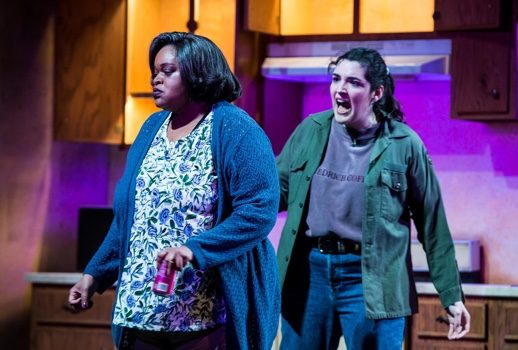
Tiffany Townsend and Sophia Hunt in Empty the House
It rained nonstop in Philadelphia the evening I saw Riders to the Sea and Empty the House. But it was nothing compared to what happened on stage in two works awash with water as metaphor.
In Riders, a soul-sucking ocean robs a desolate woman of her husband and sons. Empty the House features a storm outside and a relentless dripping sound inside, as a mother and her angry adult daughter pack up a home still haunted by the ghost of a shunned son who ultimately died of AIDS.
Taken together, these atmospheric but bleak works provide a musical illustration of the notion that misery loves company.
Riders, Ralph Vaughan Williams’ setting of John Millington Synge’s domestic tragedy, is short (just over 30 minutes) and unremittingly gloomy in its depiction of both family relations and hard-scrabble domesticity.
The score—a one-act opera, which to me sounds more like a secular cantata—is stronger on atmosphere than dramatic details. The vocal lines are gracefully composed but not especially individual or memorable. It’s in the orchestral textures that Vaughan Williams’ music shines.
Theatrically speaking, Riders can be effective when treated symbolically or naturalistically, but here director Mary Birnbaum went for something in between. Her staging captured the drabness of village life but not much else. The scenic design (by Grace Laubacher) included a vividly rendered, white-topped wave towering above the walls, but it felt like a static image, otherwise removed from the production.
Happily, the musical values were better served. Soprano Lindsey Reynolds sounded ravishing as Cathleen, with soprano Merissa Beddows very nearly her equal as Nora. Mezzo Sophia Maekawa brought gravitas and a lovely caramel color to Maurya, though one wants a larger sound for this role. Patrick Wilhelm sang well as Bartley the doomed son, as did a small off-stage chorus.
The Curtis Orchestra, under the direction of conductor Daniela Candillari, shaped Vaughan Williams’ score with exceptional clarity.
Pairing Riders with composer Rene Orth’s 2016 one-act opera, Empty the House, revealed plot connections—mothers and children locked in emotional struggles—but mostly underscored the differences. ETH, set in 1995, is extravagantly theatrical, with extended monologues for all three characters (Faith, the daughter; Brenda, the mother; Paul, the son).
Initially, I found Orth’s score interesting mostly for its intensely percussive and inventive orchestrations, but later in the course of the one-hour work, there is some beautifully lyrical vocal writing.
Orth is exceptionally gifted, but ETH strikes me as only intermittently successful. Mark Campbell’s libretto, a sometimes-arch attempt to capture contemporary speech, doesn’t feel like a good fit with Orth’s compositional style.
The story itself is melodramatic, at moments reminiscent of Marsha Norman’s play, ‘Night Mother, and Stephen King’s Carrie. The whole of the opera—which memorializes a brother and son lost to AIDS, in a time when that disease was practically a death sentence—seems much more like a work of an earlier era, similar in mood to the films like Longtime Companion and plays like As Is.
Birnbaum’s staging made a reasonably good case for ETH, though as with Riders, the sense of home life is gestured at rather than fully inhabited.
Soprano Sophia Hunt (Faith) was exceptionally strong both vocally and dramatically. Tiffany Townsend’s vibrant soprano and charismatic stage presence are well-suited to the virtuosic role of Brenda, though her heavy vibrato sometimes obscured the pitch.
Wilhelm (Paul) had far more to do here than in Riders; his baritone has a gorgeously plush color in the middle-range, but sounded less comfortable and forward at the top. Candillari and the orchestra performed superbly.
As with all Curtis/Opera Philadelphia co-productions, one appreciated the opportunity to hear gifted young artists. As a cohesive evening of drama, this ambitious double bill doesn’t quite add up.
Photos by William Brown Photography


